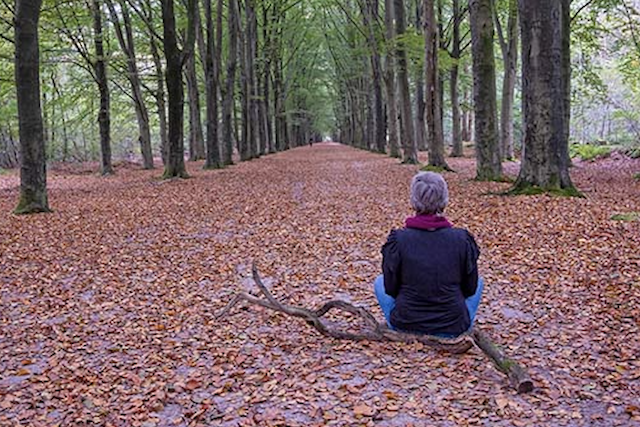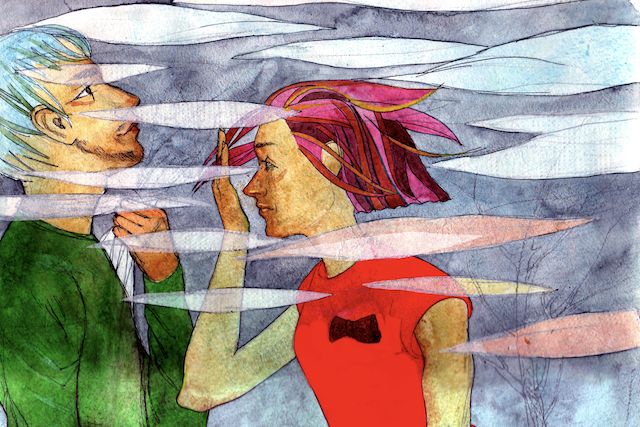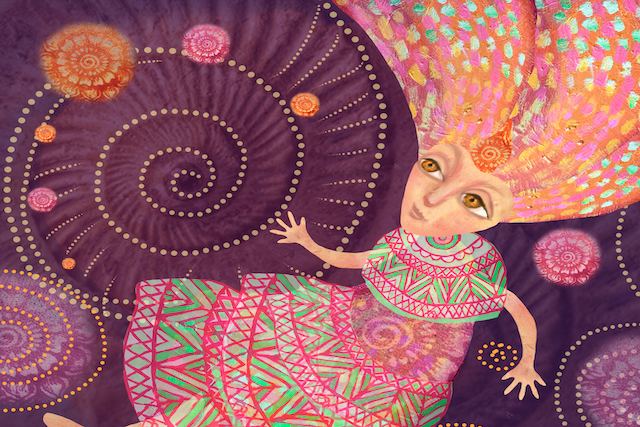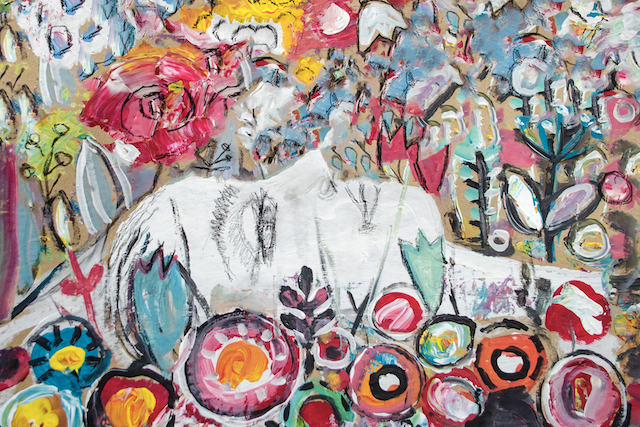
“As traumatized children, we always dreamed that someone would come and save us. We never dreamed that it would, in fact, be ourselves as adults.” ~Alice Little
Like most people, I used to run away from my pain.
I did it in lots of different and creative ways.
I would starve myself and only focus on what I could and couldn’t eat based on calories.
I would make bad choices for myself and then struggle with the consequences, not realizing that I had made any choice at all. It all just seemed like bad luck. Really bad luck.
Or I would stay in unhealthy relationships of any kind and endure the stress that was causing. Again, I didn’t see what I was contributing or how I was not only keeping my pain going but actually adding to it.
These are just a few examples of the many ways I ran away from my pain. The real pain. The one below it all. The one that started it all. The core wound.
The wound of unworthiness and unlovability.
The wound that stems from my childhood.
And my parents’ childhoods.
And their parents’ childhoods.
But this is not a piece on how it all got started or who is to blame.
No. This is about me wanting to share how I got rid of my pain.
Because discovering how to do that changed my life in ways I never thought possible.
It is something I would love for you to experience too because life can be beautiful no matter what has happened in the past. I don’t want you to miss out on this opportunity. Especially because I know it is possible for you too.
Hands on the table, I am a psychotherapist and I have been for almost ten years. I also train and supervise other psychotherapists, so I should know what I’m talking about.
But, let me fill you in on this: There are plenty of professionals who haven’t done ‘the work’ on themselves. I know, I’ve met them.
And I have met hundreds of people who don’t have any qualifications, but they have done the work on themselves. I know, I’ve felt them.
Doing the work, in the shortest possible summary, is all about facing your pain. It’s when you stop—or when you’re forced to stop, which is so often the case—and you’re done with running away from it.
It’s when you finally give up.
Sounds like a bad thing, right? But it isn’t
To heal, you have to see the pain.
We all think we see it or feel it or know it, but we don’t.
We know what it feels like to run away from it and the pain and stress that causes. The constant anxiety, the pressure, the breathlessness, the numbness. That’s what we know.
But that’s not the pain, not the pain of the core wound. Those are the symptoms of not dealing with the wound, of not healing it because you’re too afraid to even look.
It’s fear that stops us from healing.
It’s not the process of healing itself that scares us; it’s what we imagine healing means. And it usually is nothing like we imagine it to be!
Healing just means facing the pain.
Let me try to make it more practical:
Do you remember a time when you were very little, maybe three or five, or maybe a little older?
Do you remember, in your body, how it felt to be misunderstood? How to want something and then not get it? How to be punished for something you didn’t do? How to be shouted at for no reason at all just because someone else was stressed out and couldn’t control themselves?
Do you remember how that felt?
I do.
That’s the origin. All those little incidents when we were too young to understand what was going on, but we made it mean something negative about ourselves.
Because what was reflected back to us by the world, by the people we loved the most, was that something was wrong with us, that in some way we were flawed, wrong, or bad.
Our brains were too young to take a different perspective, to defend ourselves from unfair judgments and punishments, and so we took it all in.
And believing something horrible about yourself that isn’t true hurts. Believing that you’re not good enough hurts. Believing that you’re unlovable hurts.
It also scares us, and so we no longer feel safe.
Safe to be ourselves. Safe to love. Safe to be loved.
We start to hide from ourselves and our pain. We start to hide our truth and inhibit the great humans that we actually are.
Because in those moments, those moments of misunderstanding, we receive the wrong message—that we are not worthy of being heard, trusted, held, or loved.
We are pushed away, through being ignored, threatened, or punished.
And then we start doing that to ourselves.
We want or need something—just like we needed it then when it was inconvenient to a parent who shouted at us and invalidated what we wanted or needed—and we deny it or minimize it.
We want to say “enough” and set a boundary with someone—just like we wanted to when we were little but were told we didn’t know what was good for us—but we don’t do it.
We want to choose what we like or are excited by—just like we tried to when we were young but were told we were being stupid, childish, or silly—but then got for the boring, reasonable option instead.
We carry the pain on.
We don’t stop to ask ourselves whether that’s actually what we should be doing.
We try to avoid re-experiencing the pain from our childhood by treating ourselves in exactly the same ways as we were treated back then.
We don’t realize that we’re keeping that usually unconscious pattern going.
The most obvious example I can give you from my life is that I didn’t grow up surrounded by emotionally available adults. So obviously I didn’t become one either. I wasn’t emotionally available to myself, and I didn’t choose emotionally available partners in my relationships.
As a result, I got to relive my childhood experiences over and over again while not understanding why I kept feeling so depressed, unloved, and worthless.
I kept the pain going by being closed off to how I was feeling and by choosing partners who would shame, reject, or ignore me and my feelings the same way my parents had.
But I broke that cycle.
I broke it when I faced my pain.
I broke it when I stayed within myself when I felt something, no matter what it was.
When I felt disappointed that I didn’t get the grade I wanted on an important university assignment, I stayed with that disappointment.
I didn’t talk myself out of it. I didn’t talk down to myself and tell myself what a useless waste of space I was. I didn’t pity myself or blame my lecturer. I didn’t numb myself by binge-watching Netflix and eating chocolate.
No, I stayed with the disappointment.
It was like I was sitting opposite my disappointed three-year-old self, and I stayed with her.
I didn’t shout, mock her, invalidate her, leave her, or make her wrong for feeling how she was feeling.
I stayed with her. I saw her disappointment. I saw her pain. I knew what she was making it mean and I stayed with her.
I didn’t push her away. I didn’t push the pain away.
And guess what happened?
It started to speak to me! And it made sense!
It wasn’t scary or weird or awkward or crazy! It made complete sense.
And it needed me to hear it, to understand it, and to parent it.
Just like I parent my children.
“Of course, you feel disappointed. You have put so much work into this, and you didn’t get the result you wanted. I get it. I’m here to listen to you. I want to understand you.”
Do you know what that does? It calms you down. Truly.
It calms you down. It’s such a relief!
Finally, someone wants to listen! Finally, someone doesn’t turn away from me like I am the biggest threat they have ever encountered. Finally, someone looks at me with understanding and compassion.
This is what I do with all of my feelings.
If there is jealousy, I am there for it. I’m not shaming it, not judging it—I’m just here to listen, to soothe, to understand, and to act on it if it feels like that’s what it needs.
So I turn toward the pain, the feeling; I try to understand what it’s all about and see if there is anything it needs from me, something more practical.
Does my disappointment need me to ask my lecturer for feedback to improve my work for the next assessment?
Does my jealousy need me to remind myself how worthy and lovable I am? Or does it need me to choose something beautiful for me to wear because I’ve not really paid that much attention to my appearance recently? Or does it need to speak to my partner because he’s much friendlier with other women than he is with me?
A lot of the time the pain tries to alert us to doing something we need to do for ourselves.
By not facing the pain, by not tending to it, we can’t know what it is that it needs us to do—and it’s always something that’s good for us.
And so we go without what we want and need, and the pain only grows bigger and louder like the tantruming toddler that is only trying to express herself in an attempt to be heard, held, soothed, and taken care of by their parent.
It’s time to stop doing that to ourselves.
I did many years ago, and I feel like a different person. The way I live my life is different. The way I feel about myself is different. I no longer go without what I want and need.
That can’t happen as long as you use up all your energy to run away from the pain.
The pain is your invitation to do the healing work. It invites you to stay and listen, to find out what’s really going on below all distractions and symptoms.
What is the feeling that needs to be felt?
What is the pain that needs to be witnessed and understood?
And what does it need you to do for it so the core wound can finally heal?
You have the power to heal it. You are the only one you need to heal it. But you have got to stay and learn to be there for it, learn to be there for yourself.
That’s it.
Unlike other people, you don’t walk away. You don’t say no to yourself. You don’t go against yourself and make yourself wrong.
You stay. You feel it. You give it what it needs.
And that’s when it heals.
![]()
About Marlena Tillhon
Marlena is a highly experienced psychotherapist and success coach specialising in healing inner trauma and breaking unhealthy patterns that stop her ambitious clients from having the success they know they can have in their lives, relationships, and careers. You can find her on Instagram or Facebook and receive her free training and gifts on her website.
Get in the conversation! Click here to leave a comment on the site.
The post The Childhood Wounds We All Carry and How to Heal Our Pain appeared first on Tiny Buddha.
from Tiny Buddha https://ift.tt/tZNVp97








